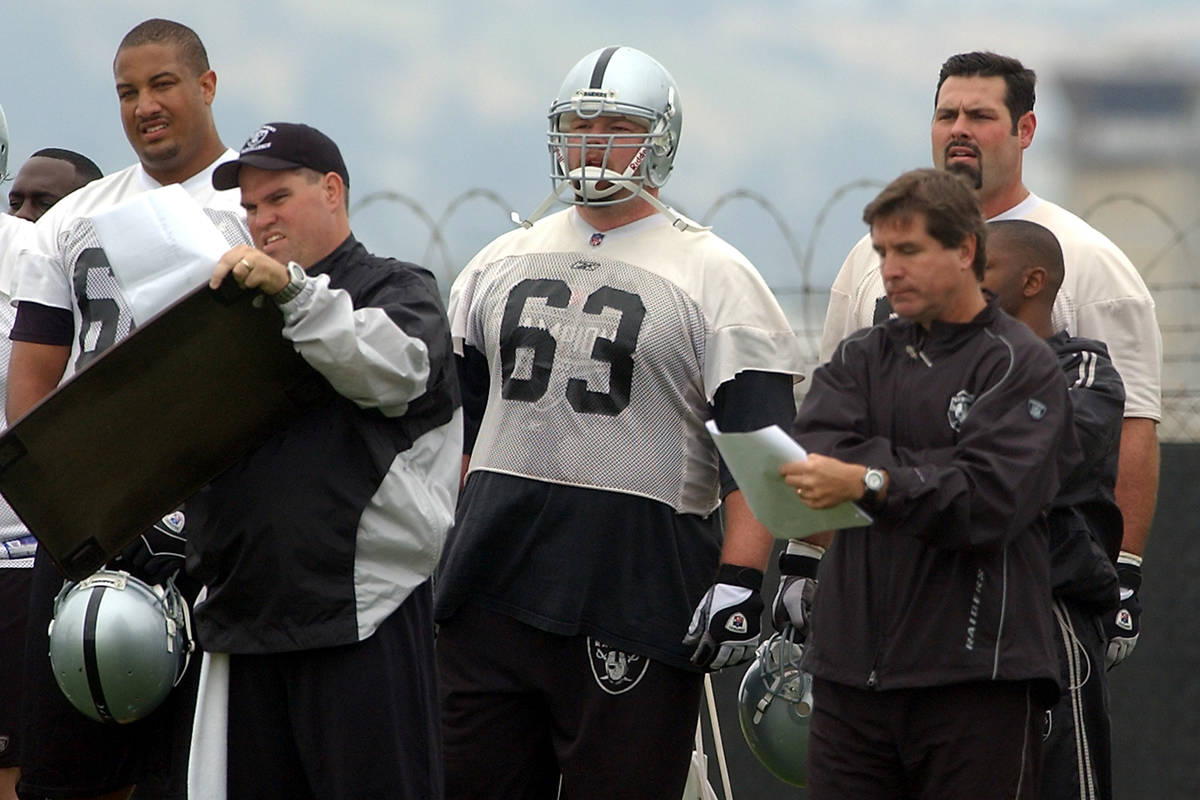Mystery of ex-Raider Barret Robbins brought to life in Bay Area podcast
Barret Robbins sat in a South Florida prison at the time on a drug charge. It was 2011 and a lifetime from his Sundays as an All-Pro center for the Oakland Raiders, from the night during Super Bowl week in which he disappeared and crossed the border into Tijuana.
The never-before-heard interview with Robbins from nine years ago was recently found at the San Francisco-based offices of NBC Sports Bay Area in California.
What was believed lost has instead led to the podcast episode “Sports Uncovered: The Mysterious Disappearance That Changed a Super Bowl.” It’s the network’s fifth installment of the podcast “Sports Uncovered.”
How much Robbins missing Super Bowl XXXVII affected the Raiders in a 48-21 loss to Tampa Bay in San Diego has long been debated. Some believe it played a major role in the outcome. Others aren’t so convinced.
Tim Brown is, and the Hall of Fame wide receiver was fairly specific in assigning blame when also interviewed in 2011, pointing the finger at former Raiders head coach Bill Callahan.
Changing the game plan
Some context: Robbins left the team two days before the game and returned incoherent and confused the night before it. At that point, Callahan removed him from the roster and sent him from the players’ hotel to an alternate one.
Robbins had been diagnosed with depression in college at Texas Christian, and alcohol abuse and bipolar disorder would ultimately be given as reasons for his vanishing act before the biggest game of his life.
He would later refer to it as a manic episode. Family members said that while in Tijuana Robbins believed the Raiders had already won the game and was celebrating.
But his teammates have spoken often about how Callahan, on the morning of the day Robbins left, inexplicably changed how the Raiders were going to play.
That the coach had preached all week about running the ball for four quarters against a smaller Tampa Bay defense and then, suddenly, 48 hours before kickoff, told the players they were shifting to a wide-open passing attack.
“We gonna smash-mouth and we’re gonna, you know, beat these little guys up,” Brown says on the podcast. “Practice, Wednesday, Thursday, we jumping around, having a great time. Friday morning, we get in and have a brand-new game plan.
“The guy this is going to affect most is Barret Robbins, because Barret Robbins is the one who has to make all the (play) calls. He is begging Callahan, ‘Don’t do this. I don’t have time to prepare for this. Please don’t do this.’
“I was with him and he’s begging (Callahan), ‘You can’t do this to me.’ And (Callahan says), ‘No, this is what we gonna do. This is what we gonna do.’ Well, it’s that night that Barret went out and went AWOL.
“Now, does one have to do with another? I say yes. You may say no. I say yes.”
Reactions differed. Some teammates said after the final seconds ticked away in the Super Bowl loss that if Robbins returned the following season, they wouldn’t. Others held the same opinion as Brown, insisting Callahan’s last-minute switch in philosophy wasn’t fair to the center.
It is pointed out on the podcast that multiple attempts to reach Callahan for comment through the Cleveland Browns, where he is now the offensive line coach, proved unsuccessful.
Robbins earned his starting role back in 2003 but was then cut by the Raiders the following summer after testing positive for steroids, ending his nine-year NFL career.
His attempts at recovery have since resembled one monster of a roller-coaster ride.
Fighting the demons
The “Sports Uncovered,” podcast examines several storylines regarding that Super Bowl loss, including how a former Raiders teammate found Robbins in a San Diego bar and returned him to the team hotel; why the Raiders’ locker room might not have been the best place for Robbins; how positive some players were that Callahan sabotaged the team’s chances to win against their former coach, then Tampa Bay boss and now Las Vegas Raiders coach Jon Gruden; and a look at Robbins’ troubled post-NFL life, including details from a 2019 arrest that could give light to his present whereabouts.
Robbins sat in that South Florida prison in 2011 off a case that stemmed from crack cocaine being found in his car following a traffic stop. He was on probation from a 2005 incident in Miami Beach, during which he fought with police and was shot several times in the torso.
There have been other arrests, other very dark moments.
And yet as disturbing as his issues have been, Robbins probably will never escape the central image so many hold of him from a few days in San Diego many years ago.
Some believed it altered the outcome of a Super Bowl.
Some … not so much.
“The fact that your center went down to Tijuana and got lost,” says former Tampa Bay defensive tackle Booger McFarland on the podcast, “and all of a sudden, um, he’s not the quarterback, he’s not the star wideout. He’s not the star defensive player.
“He’s the center.”
One whose infamous journey is now much better explained through a 2011 interview thought lost.
Ed Graney is a Sigma Delta Chi Award winner for sports column writing and can be reached at egraney@reviewjournal.com or 702-383-4618. He can be heard on “The Press Box,” ESPN Radio 100.9 FM and 1100 AM, from 7 a.m. to 10 a.m. Monday through Friday. Follow @edgraney on Twitter.


















